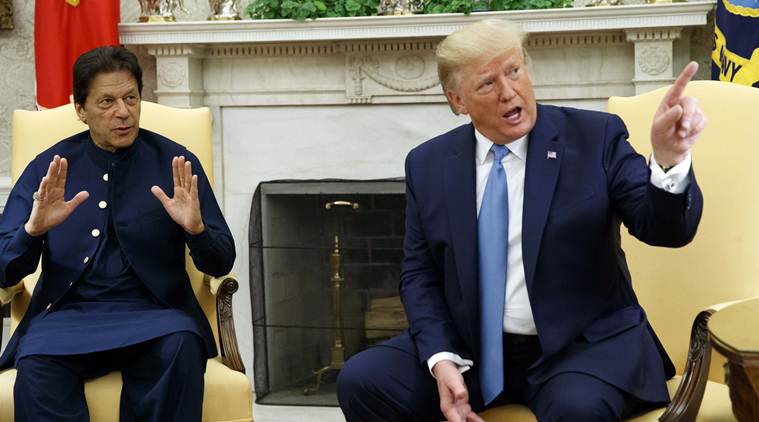
President Donald Trump has done it again. He has spoken a complete falsehood, without thinking about the consequences, out of turn and without knowledge of the issue on which he was pontificating. Prime Minister Narendra Modi deserves to be criticised on many counts but I cannot believe that he could ever have made such a preposterous suggestion to Trump. Even a child in India knows the country’s position on a dialogue with Pakistan. But I was disappointed by the external affairs minister’s statement in Parliament on this issue on July 23. He referred to the Simla Agreement and the Lahore Declaration, but failed to mention the very important January 6, 2004 Joint Press Statement issued in Islamabad after a meeting between Prime Minister Atal Bihari Vajpayee and President Pervez Musharraf. I would place this statement in the same league as the Simla Agreement and the Lahore Declaration.
The statement was issued almost at the end of Vajpayee’s second term as prime minister. In the six years before that, India-Pakistan relations had gone through a roller-coaster ride starting with his bus yatra to Lahore followed by the Kargil war; then there was the failed Agra summit followed by the attack on the Indian Parliament. This led to Operation Parakram when our troops were eyeball-to-eyeball with the Pakistani forces along our border and the LoC. But Vajpayee was genuinely interested in peace with Pakistan. So, after a year of the confrontation, he made his peace offer again, this time from Srinagar. This led to gradual disengagement of the two armies and a number of confidence building measures were announced unilaterally by India. Pakistan reciprocated. So, when the SAARC summit was due to take place in Islamabad, India took a calculated risk and Vajpayee travelled there. The visit was a great success bilaterally and the outcome was the Joint Press Statement of January 6, 2004. A part of it is reproduced below:
“The President of Pakistan and the Prime Minister of India met during the SAARC Summit in Islamabad…Both leaders welcomed the recent steps towards the normalisation of relations between the two countries… Prime Minister Vajpayee said that in order to take forward and sustain the dialogue process, violence, hostility and terrorism must be prevented. President Musharraf reassured Prime Minister Vajpayee that he will not permit any territory under Pakistan’s control to be used to support terrorism in any manner. To carry the process of normalisation forward, the President of Pakistan and the Prime Minister of India agreed to commence the process of composite dialogue in February 2004. The two leaders are confident that the resumption of the dialogue would lead to peaceful settlement of all bilateral issues, including Jammu and Kashmir, to the satisfaction of both sides. The two leaders agreed that constructive dialogue would promote progress towards the common objective of peace, security and economic development of our peoples.”
Musharraf had spoken of not allowing the territory under the control of Pakistan to be used for violence and terrorism against India even earlier but this was the first time he agreed to include it in a bilateral document. It was also a clear admission by Pakistan that the territory under its control (read Pak-Occupied-Kashmir) was indeed being used for terrorism against India. This was a unilateral commitment given by Pakistan which did not demand any such commitment from India as it did at Sharm-el-Sheikh where it insisted and succeeded in including a reference to Balochistan in the joint statement. The January 6, 2004 statement also clearly established the principle that resumption of dialogue with Pakistan was not automatic but was contingent upon Pakistan stopping cross-border terrorism against India.
Musharraf must have realised the importance of the statement and the commitment Pakistan had made in it. Therefore, no sooner did the Vajpayee government demit office that he tried to wriggle out of these commitments. Unfortunately, the UPA government, like the present NDA government, failed to realise the value of this statement and allowed it to get buried under the weight of the not-so-significant statements issued subsequently. Pakistan could not have asked for more.
Relations with Pakistan should not be a partisan issue. An all-party consensus has always guided our policy towards Pakistan barring a few differences with regard to nuances. But the problem is that not only does Pakistan go back on the promises it makes, but every prime minister in India also forgets history and starts from the beginning. One would have expected a foreign service professional who is now the external affairs minister to remember the not-so-ancient history and refer to the 2004 statement in his speech in Parliament. Amnesia is a good virtue at times but not when you are dealing with an extremely sensitive issue like India-Pakistan relations.
Trump is a bull in a china shop. We do not have to bother much about what he says. But the PM should have appeared in both Houses and set the matter at rest.
The writer is a former Union external affairs and finance minister